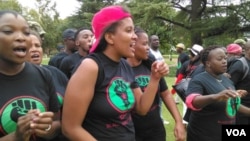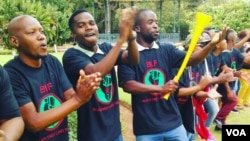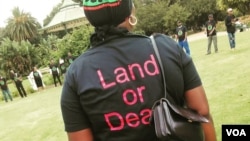A small but noisy group of South African activists gathered Friday in the nation’s capital to bring attention to an issue that is gaining momentum at the highest levels of government: How to resolve long-standing issues that leave black South Africans economically worse off than their white counterparts more than 20 decades after the end of the racist apartheid system.
Some 200 Black First Land First activists gathered Friday morning in a soggy Pretoria park named after a long-dead colonial-era president who helped the British empire claim vast tracts of South African land. On this rainy day, protesters wearing “LAND or DEATH” T-shirts sang protest songs seeking restitution for apartheid-era profits from a major South African bank.
As its name indicates, this pressure group has its sights set on something far bigger. Members want land to be given to black South Africans as compensation for colonial-era land seizures.
This debate has reached the top echelons of government. Just kilometers from the park, President Jacob Zuma, from his office, referred a bill back to parliament that seeks to redress racial imbalances in land ownership.
‘Right to defend ourselves’
Activists say the government’s efforts are insufficient. This far-left group objects to the current policy that allows landowners to hold out until the selling price is acceptable. Lindsay Maasdorp, national spokesman for Black First Land First, says Zuma’s constitutionally based approach is also not enough, and that change needs to come sooner -- and that it may not be pretty.
“Black people must stand up and literally take back the land,” he told VOA. “We will not wait for a constitution that is anti-black and enshrines land theft to determine when we take back land…. We’re saying black people should not be buying back stolen land. We agree that we should not. White people didn’t come here and just start speaking to us and say, ‘let me just take it.’ It was a violent process, and it continues to be a violent process…. When we confront violence we will do so with violence too. Sometimes it will be with words, sometimes it will be through dialogue. But other times, it will be physical as well. Why? Because we have the right to defend ourselves against those who have taken our land from us.”
In recent years, anger over land inequality has been accompanied by violence against owners of farms and small-holdings. South African police typically report about 500 incidents each year. Unemployed protester Simon Kgofelo, 45, says his lack of land affects him deeply.
“When talking about the debate of land, I’m becoming too emotional,” he said. “Because at this present, we shouldn’t even be talking about this. We have had about 23 years into democracy and there is nothing that is happening with the land distribution. Eighty percent, it’s still whites having 80 percent of land. And we, the majority, we are having 20 percent.”
That 80 percent statistic has been thoroughly debunked by analysts who refer to the government’s own land surveys.
A recent private survey looking at residential property says black South Africans own 52 percent of the value of the nation’s homes, and that the figure is rising; however, nearly 80 percent of South Africa’s population is black, meaning they are still underrepresented in this domain.
Earnest effort or maneuvering?
This imbalance clearly preoccupies President Zuma, who spent about 15 minutes of his recent 90-minute address to the nation talking about the need for what he called “radical economic transformation” -- a plan to use government programs and resources to encourage more economic participation by black South Africans.
“It will be difficult -- if not impossible -- to achieve true reconciliation until the land question is resolved,” he said.
He added, “The skewed nature of ownership and leadership patterns needs to be corrected. There can be no sustainability in any economy if the majority is excluded in this manner ...Today we are starting a new chapter of radical socioeconomic transformation. We are saying that we should move beyond words, to practical programs. The state will play a role in the economy to drive that transformation.”
But, says associate professor of economics Christopher Malikane of the University of the Witwatersrand, Zuma’s ambitious plans may just be political maneuvering. Analysts say Zuma’s growing unpopularity led the long-ruling African National Congress to lose ground in last year’s local elections. As a result, the party is now divided and scrambling to gain support ahead of crucial national elections in 2019. This radical economic transformation, Malikane says, may be a casualty of the current rift in the ruling party between those who support Zuma and those who don’t.
“It is the struggle between these two factions within the ANC that is going to lead the ANC to not coherently implement what the president is talking about,” he told VOA. “Because his faction is not 100 percent in control of the ANC.” Many protesters on Friday said they have little interest in watching this complex debate go through the political and legislative motions.
They want land, they say, and they want it now.






